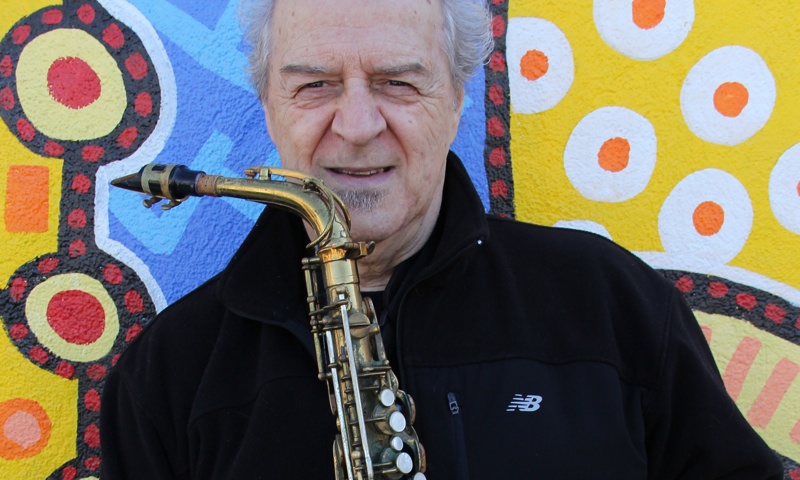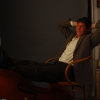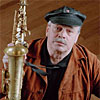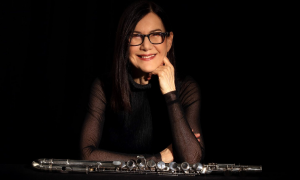Home » Jazz Articles » Interview » Ron Aprea: Passion Supreme
Ron Aprea: Passion Supreme

Ron Aprea
arranger
Frank Foster
saxophone1928 - 2011

Lionel Hampton
vibraphone1908 - 2002

Woody Herman
band / ensemble / orchestra1913 - 1987

Angela DeNiro
vocalsAll About Jazz: Please tell us how Remembering Blakey came about.
Ron Aprea: The album came about in an ambiguous kind of a way. Originally, it was going to be a big band album. I had spent close to a year writing big band charts. Had a couple of rehearsals in town and the band sounded wonderful, the music was fine but, I then realized that this big band production was too big for my budget. So, I decided to scale things down and add some new tunes and decided to record with the sextet. In re-writing the music, I kept hearing "Blakey"—Blakey's name kept popping up at different times while I was in the process of re-writing the music. Still, I hadn't thought about calling it "A Tribute to

Art Blakey
drums1919 - 1990

Vince Cherico
drumsAAJ: Are there any Blakey compositions or tunes on the recording?
RA: No, actually there are not. These arrangements are in the Blakey style. Blakey, as most people know, was a great drummer, not a composer that I'm aware of. This wasn't an imitation or remake of Blakey material. This is music played in the "Blakey style" which is Hard Bop—with background riffs behind the solos. A "Jazz Messengers" style to it without actually playing any tunes that Blakey recorded.
AAJ: Paul Brusger did a number of original tunes for the recording. Can you tell us a little about his writing style and why you selected those compositions?
RA:

Paul Brusger
bass, acousticb.1959
AAJ: Having listened to the recording, I think that Paul has really captured the "Blakey vibe" or sound in the compositions and the performance.
RA: Paul is from that Hard Bop school. He's also a fine bassist, and hard bop is his meat. I thought his tunes would be perfect for this project. We recorded six of Paul's originals, plus some standards. But, it's fun playing his tunes; they are a challenge and some of his changes are different and interesting.
AAJ: I believe some of his tunes here are based on other tunes' changes—"Flown the Coop" on "Sweet Georgia Brown" and "Andrea's Delight" on "Giants Steps" or "Ladybird?"
RA: "Andrea's Delight" is not either. They're his own chord changes—he goes through a number of key changes on this tune. He'll write tunes on standard changes and he'll write tunes on his own chord changes as well.
 AAJ: Please tell me about your choice of personnel on this recording. Why these players?
AAJ: Please tell me about your choice of personnel on this recording. Why these players? RA: Well, I hand-picked people who understand this style. I couldn't think of a better horn section than trumpeter,

Joe Magnarelli
trumpetb.1960

Jerry Weldon
saxophone, tenorAAJ: And the rhythm section?
RA: The rhythm section, with great care, was hand-picked as well—all friends who I've worked with before. Pianist

Cecilia Coleman
keyboardsb.1962
Tim Givens
bass AAJ: Can you tell us a little about your background and playing history?
AAJ: Can you tell us a little about your background and playing history? RA: I was fortunate to play in a lot of great big bands. The early part of my career was spent touring with Woody Herman, Lionel Hampton,
Les Elgart
b.1918
Buddy Morrow
trombone1919 - 2010

Nat Adderley
trumpet1931 - 2000

Tito Puente
drums1923 - 2000

John Lennon
guitar and vocals1940 - 1980
AAJ: In listening to the ballads on Remembering Blakey—"Goodbye," "Sophia," "My Foolish Heart" and "Lover Man," you play very passionately. Who were some of your playing influences?
RA: OK, I guess, thinking back early on,

Johnny Hodges
saxophone, alto1907 - 1970

Charlie Parker
saxophone, alto1920 - 1955

John Coltrane
saxophone1926 - 1967

Lou Donaldson
saxophone1926 - 2024

Jackie McLean
saxophone, alto1932 - 2006

Eric Dolphy
woodwinds1928 - 1964

Sonny Stitt
saxophone1924 - 1982

Phil Woods
saxophone, alto1931 - 2015

Charlie Mariano
saxophone, alto1923 - 2009
AAJ: "Goodbye" is on "Remembering Blakey." I know that you did a "Goodbye" You Tube solo as a dedication to your long-time friend, Frank Foster. Please tell me about your friendship with Frank and how that came about.
RA: When I was old enough to get my driver's license, I'd go to Birdland all the time. I was living in Astoria, Queens, outside of New York City, and Basie's band would always be playing at Birdland. When Basie was in town, I would go down there two or three nights a week and just listen to that band. Frank Foster had already become an international star—an up and coming monster! And he was writing all these great charts for the Basie Band, such as "Blues in Hoss' Flat," "Discommotion," "Shiny Stockings," "Who Me," and many more. And I remember going down there with a couple of my friends around the holidays. We gave the announcer/ma?tre d,'
Pee Wee Marquette
poet / spoken wordAnd I remember this photographer gal coming over and wanting to take our picture. One of my friends asked: "If you bring Frank Foster over, then you can take our picture," never thinking that would ever happen. Well, she leaves and about 10 minutes later, when the band took a break, she comes over with Frank Foster—she was determined to make that sale! So Frank then comes over, sits down at the table, and we started chatting. Of course, we took the picture.
I had just put a big band together. My first big band—a rehearsal band. We were playing stock arrangements—you know, Johnny Warrington stocks. In those days, if you needed an arrangement, you wrote your own or bought stock arrangements. So, in talking to Frank that night, I asked him if he had any old arrangements. Frank then said for us to come back one night and he's give us some stuff. So, I went back by myself, and Frank comes over and says "Sorry, I forgot the music. But I don't want you to leave empty-handed." So, the next thing I know, I look up at the bandstand, right before the next set and I see Marshall Royal,

Sonny Payne
drums1926 - 1979

Frank Wess
saxophone, tenor1922 - 2013

Benny Powell
trombone1930 - 2010

Snooky Young
trumpet1919 - 2011
Frank had two small kids and so did I. Sometimes we'd just get together and take the kids for a walk in Central Park and just hang. But always talking about music. Frank, after more than a decade of playing with Basie, started getting tired of touring and doing one-nighters. He made up his mind to leave Basie and put his own big band together. Since I knew the local scene, he asked me to give him a hand with the contracting, which I did. I also did some copying and was happy that I finally had an opportunity to repay Frank for all that he had done for me.
That was over fifty years ago. We stayed great friends. I played in his band for a couple of years. Got to play with

Elvin Jones
drums1927 - 2004

Blue Mitchell
trumpet1930 - 1979

Jimmy Owens
trumpetb.1943

Benny Green
pianob.1963

Arnie Lawrence
saxophoneb.1938

Major Holley
bass, acoustic1924 - 1990

Duke Ellington
piano1899 - 1974
 AAJ: Going back to the album for a second, in listening to the album, there's very much a "live vibe" to it. Was that intentional?
AAJ: Going back to the album for a second, in listening to the album, there's very much a "live vibe" to it. Was that intentional? RA: I work hard on this. I built my own studio about ten years ago. And every time I do a project, I get a little better with the sound. I think what a lot of people in the recording industry don't understand is that it's not how much equipment you have, rather it's knowing what musical instruments are supposed to sound like. A lot of recording engineers today don't do acoustic recording, so you can't really blame them. They don't know what a live guitar or saxophone sounds like. It's all electronics and synths now. These kids know their equipment better than I ever will. I don't know the difference between an Hz and a potato. I mix from the seat of my pants and I sit there and play with it until it sounds right. I pride myself on getting a good sound in my studio. Several reviewers, including you, have commented about the good fidelity on Remembering Blakey and I get as big a kick out of that as the positives about the music itself.
AAJ: As we speak today, Remembering Blakey has received outstanding reviews and has even been submitted for a Grammy nomination.
RA: I'm overwhelmed by the response I'm getting from musicians and the reviews. I went on one website and read like eighteen five-star reviews.
AAJ: Why do you think that is?
RA: I don't know. Part of it, I guess, is that a lot of new albums are trying to hard to be different. For this Grammy program, I'm listening to literally hundreds of artists' productions. We share our music and try to gain support. Some of it is great, but many are way over-produced—maybe trying too hard to be different and innovative. And maybe forcing it a bit in some cases. Apparently there is still an audience for straight ahead music that swings.
AAJ: I think it's because it's a very genuine presentation. A fine portrait of the musicians here and the Blakey/Messenger Era and classic Hard Bop tradition.
RA: I think there's simplicity here. Not that the music is simple or easy to play, but simplicity is in the style. It's straight-ahead, toe-tapping, high-energy, happy music and easy to understand. A Hard Bop feel to it. Not many people are doing that anymore. So in that respect it's really different, but it's pretty much what I've been doing all my life.
AAJ: What's coming down the pike?
AAJ: On behalf of All about Jazz, thank you and good luck on the Grammy nomination and all your future projects.
RA: Thank you Nick, and thanks to All About Jazz.
Tags
Ron Aprea
Interview
Nicholas F. Mondello
United States
Frank Foster
Lionel Hampton
Woody Herman
Angela DeNiro
Art Blakey
Vince Cherico
Paul Brusger
Joe Magnarelli
Jerry Weldon
Harry Connick Jr.
Cecilia Coleman
Tim Givens
Les Elgart
Buddy Morrow
Nat Adderley
Tito Puente
John Lennon
Johnny Hodges
Charlie Parker
John Coltrane
Lou Donaldson
Jackie McLean
Eric Dolphy
Sonny Stitt
Phil Woods
Charlie Mariano
Pee Wee Marquette
Sonny Payne
Frank Wess
Benny Powell
Snooky Young
Elvin Jones
Blue Mitchell
Jimmy Owens
Benny Green
Arnie Lawrence
Major Holley
duke ellington
Comments
PREVIOUS / NEXT
Support All About Jazz
 All About Jazz has been a pillar of jazz since 1995, championing it as an art form and, more importantly, supporting the musicians who make it. Our enduring commitment has made "AAJ" one of the most culturally important websites of its kind, read by hundreds of thousands of fans, musicians and industry figures every month.
All About Jazz has been a pillar of jazz since 1995, championing it as an art form and, more importantly, supporting the musicians who make it. Our enduring commitment has made "AAJ" one of the most culturally important websites of its kind, read by hundreds of thousands of fans, musicians and industry figures every month.






 Buy Now
Buy Now























